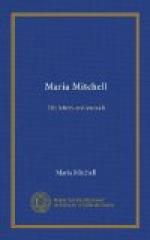“DEAR SIR: Without the honor of your personal acquaintance, I take the liberty of addressing you on a subject which I am confident will interest you as a friend of American science. You are doubtless aware that by the liberality of one of the kings of Denmark, the father, I believe, of his late Majesty, a foundation was made for a gold medal to be given to the first discoverer of a telescopic comet. Mr. Schumacher, of Altona, and Mr. Baily, of London (and since his decease Mr. Airy, Astronomer Royal at Greenwich), were made the trustees of this foundation. Among the regulations established for awarding the medal was this: that the discoverer should, by the first mail which leaves the place of his residence after the discovery, give notice thereof to Mr. Schumacher if the discovery is made on the continent of Europe, and to Mr. Airy if made in any other part of the world; provided that, if the discovery be made in America, the notice may be given to the Danish minister at Washington. It has been deemed necessary to adhere with great strictness to this regulation, in order to prevent fraudulent claims.
“On the first day of October last, at about half-past ten o’clock in the evening, a telescopic comet was discovered, in the island of Nantucket, by Miss Maria Mitchell, daughter of Hon. W. Mitchell, one of the executive council of this State. Mr. Mitchell made an entry of the discovery at the time in his journal. In consequence of Miss Mitchell’s diffidence, she would not allow any publicity to be given to her discovery till its reality was ascertained. Her father, however, by the first mail that left Nantucket for the mainland, addressed a letter to Mr. W.C. Bond, director of the observatory in this place, acquainting him with his daughter’s discovery. A copy of this letter I herewith transmit to you. The comet was not discovered in Europe till the 3d of October, when it was seen by Father de Vico, the celebrated astronomer at Rome.
“You perceive from this statement that, if Mr. Mitchell had addressed his letter to the Danish minister at Washington instead of Mr. Bond, his daughter would have been entitled to the medal, under the strict terms of the regulations. But these regulations have not been generally understood in this country; and as the fact of Miss Mitchell’s prior discovery is undoubted, and recognized throughout Europe, it would be a pity that she should lose the medal on a mere technical punctilio. The comet is constantly called ‘Miss Mitchell’s comet’ in the monthly journal of the Royal Astronomical Society at London, and in the ‘Astronomische Nachrichten,’ the well-known astronomical journal, edited by Mr. Schumacher himself, at Altona. Father de Vico (who, with his brothers of the Society of Jesuits, has left Rome since the revolution there) was at this place (Cambridge) three days ago, and spoke of Miss Mitchell’s priority as an undoubted fact.




